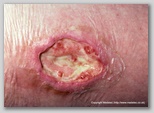LOW DOSE ASPIRIN CAN TREAT VENOUS ULCERS ON EXTREMITY
Prof Dr,DRAM,HIV /AIDS,HEPATITIS ,SEX DISEASES & WEAKNESS expert,New Delhi,India, +917838059592
Venous ulcers are only in about 1% of the adult population per year due to varicise veins or venous trauma and only form of treatment available is either Compression therapy in the form of bandage systems or hosiery or le raising up and keeping it clean and protected from infection, is the mainstay of treatment, but in trials of venous leg ulcers about half the participants remain unhealed after three months of treatment.Pentoxifylline and micronised purified flavonoid fraction are recommended adjuvants to compression,but there are barriers to use, including frequency of dosing regimen, off-label use, cost, and the quality of evidence.
 Aspirin has been advocated as an adjuvant treatment for venous leg ulcers, based on suggestive evidence from two trials using 300 mg doses, although a Cochrane review concluded the evidence was insufficient to be definitive. The use of aspirin for treating venous leg ulcers has biological plausibility. The haemodynamic forces associated with venous hypertension in venous leg ulcers activate leucocytes and cause platelet aggregation and activation. Patients with chronic venous insufficiency have statistically significantly higher platelet counts compared with normal controls or people with non-venous leg ulcers, increased platelet reactivity compared with normal controls, and increased levels of platelet microparticles (shed by activated platelets).
Aspirin has been advocated as an adjuvant treatment for venous leg ulcers, based on suggestive evidence from two trials using 300 mg doses, although a Cochrane review concluded the evidence was insufficient to be definitive. The use of aspirin for treating venous leg ulcers has biological plausibility. The haemodynamic forces associated with venous hypertension in venous leg ulcers activate leucocytes and cause platelet aggregation and activation. Patients with chronic venous insufficiency have statistically significantly higher platelet counts compared with normal controls or people with non-venous leg ulcers, increased platelet reactivity compared with normal controls, and increased levels of platelet microparticles (shed by activated platelets).
Aspirin could interrupt platelet aggregation and activation through inhibition of platelet cyclooxygenase or vessel wall cyclooxygenase. Platelet inhibition by aspirin is achieved by doses as low as 81mg,although variability in response has been described with formulation, obesity, and rate of platelet turnover.Bleeding risks are associated with aspirin use and the risks increase with dose, particularly in elderly people.
- Kidney stones universally present hazard in north india,dillution by water prevent it
- Steroid and placebo effect equally for mild persisting asthma with low sputum eosinophils
- Government wants to fix public healthcare staff shortages with ayush docs: will it work?
- Plea in hc for payment of salaries of edmc, north mcd teachers and doctors
- 7 indian pharma companies named in us lawsuit over inflating generic drug prices
- Woman in up dies after explosion in her mouth during treatment,what is diagnosis?
- Woman in up dies after explosion in her mouth during treatment,what is diagnosis?
- Woman in up dies after explosion in her mouth during treatment,what is diagnosis?
- Air pollution ! mothers organising rally in london,anaesthetist choosing gas,will india follow?
- Cardiac arrest is always not sudden as understood -a study

 Comments (
Comments ( Category (
Category ( Views (
Views (